Treating Attacks
MS relapses are caused by inflammation in the central nervous system that damages the myelin coating around nerve fibers. This damage slows or disrupts the transmission of nerve impulses and causes the symptoms of MS. For relapses that interfere with a person’s mobility, safety, or overall ability to function, most neurologists recommend treatment with corticosteroids.
The most common treatment regimen is a three-to-five-day course of high-dose, intravenous corticosteroids to reduce inflammation and end the relapse more quickly. This regimen may or may not be followed with a slow taper of oral prednisone. Corticosteroids are not believed to have any long-term benefit on the disease.


Slowing Down MS
To alter the course of the disease, a number of disease-modifying therapies (DMTs) are available which are designed to help slow down the long-term progression of MS. These treatments, or disease-modifying agents, have been shown in clinical trials to be effective in decreasing the frequency of relapses and the number of lesions in the brain or spinal cord. Some of these medications have also been shown to slow down the rate at which a person with MS accumulates disability.
Manage Your Symptoms
Symptom management is a very important consideration in the overall treatment of MS. Symptoms vary greatly from one individual to another and each symptom needs to be addressed by healthcare professionals who specialize in MS.
How To Manage
A wide variety of medications are used to help manage the symptoms of MS.
In addition to medications prescribed for a specific symptom, there are also other treatment therapies available.
Click the category
That applies to your MS and see the available treatments.


Rehabilitation in MS Care
Rehabilitation is an essential component of comprehensive MS care throughout the disease course. The goal of rehabilitation is to improve and maintain function. From the time of diagnosis onward, rehabilitation specialists provide education and treatment strategies designed to promote good health and overall conditioning, reduce fatigue, and help you feel and function your best at home and at work.
If symptoms begin to interfere with everyday activities, the rehabilitation team can address problems with mobility, dressing and personal care, role performance at home and work, and participation in leisure activities.
Strategize new treatment tactics that improve and maintain function.
Feel and function your best when you’re at home or at work.
Promote good health and overall conditioning.
Address problems with mobility, personal care, and role performance.
Alternative Therapies in MS Care
Many people with MS use complementary and alternative medicine (CAM), which refers to unconventional medical practices that are not part of mainstream medicine. The term complementary medicine refers to therapies that are used in addition to conventional medicine, while the term alternative medicine is used to describe treatment that is used instead of conventional medicine.
Surveys have shown that approximately 90% of people who use CAM also use conventional medicine. Thus, a small fraction of people who use CAM do so in a truly alternative manner.


